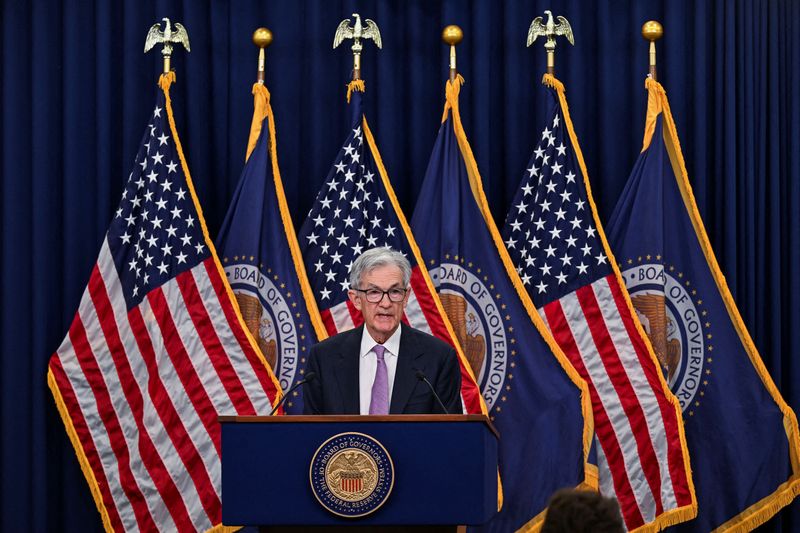By Indradip Ghosh
BENGALURU (Reuters) – The U.S. Federal Reserve will cut interest rates by 25 basis points on Dec. 18, according to 90% of economists polled by Reuters, with most expecting a pause in late January amid concerns about rising inflation risks.
President-elect Donald Trump’s proposed policies, from import tariffs to tax cuts, are expected to be inflationary. Trump is expected to move quickly on his agenda soon after he is inaugurated on Jan. 20.
News on Friday that the U.S. job market continued to cool but remained relatively resilient solidified expectations the Fed can afford to cut interest rates again before taking stock on government policy early next year.
“With the jobs report showing more slack despite solid income and job gains, we reiterate our call for another 25bp Fed cut in December,” said Jonathan Millar, senior U.S. economist at Barclays (LON:BARC).
An overwhelming majority of economists, 93 of 103, in the poll taken after the jobs data expected a 25 bps reduction at the Dec. 17-18 policy meeting, taking the federal funds rate to 4.25%-4.50%. Ten saw no change.
Interest rate futures are in line, with a quarter point cut almost completely priced in.
But a clear majority of economists, 58 of 99, predicted the Fed, which has already reduced the fed funds rate by a cumulative 75 bps since September, would hold rates at its Jan. 28-29 meeting. That would be just over a week after Trump returns to the White House.
Beyond that, there is no clear consensus among economists for what the Fed will do.
“They (the Fed) are going to wait to see what happens next year, what is actually implemented versus what is kind of presented as a risk,” said Stephen Juneau, a U.S. economist at Bank of America.
The Fed is currently on a mission to get the funds rate down to neutral, which neither restricts nor stimulates the economy. Its most recent assessment of that rate is around 2.9%.
Fed Chair Jerome Powell said recently policymakers “can afford to be a little more cautious as we try to find neutral” as the economy is stronger and inflation exceeded the central bank’s September forecasts.
Nearly 60% of economists, 56 of 97, predicted at least three more 25 bps rate cuts by the end of next year to 3.50%-3.75% or lower. That majority is down from over 90% in October and more than 70% in November.
“ Next (LON:NXT) year, the emerging disagreements about the degree of restrictiveness of monetary policy, or correspondingly about the estimates of the neutral policy rate, will likely become more contentious,” said Barclays’ Millar.
“Meanwhile, increased tariffs on imports are likely to keep core inflation elevated in 2025. In that context, we think it will be difficult for the (Fed) to cut rates more than twice next year.”
The U.S. economy, which grew an annualized 2.8% last quarter, will expand 2.1% next year and 2% in 2026, poll medians showed, faster than what Fed officials currently see as the non-inflationary growth rate of 1.8% over the coming years.
The 2025 inflation outlook was broadly upgraded from last month. A 75% majority of economists, 36 of 48, said the risk of a resurgence in inflation in the economy next year was high. The rest said it was low.
“In the medium term, higher tariffs and potential supply chain disruptions due to aggressive trade policy under the incoming Trump administration will likely drive core inflation significantly above 3% in mid-2025,” noted David Seif, chief economist for developed markets at Nomura.
The Fed will publish its latest set of quarterly forecasts at the December meeting.
(Other stories from the Reuters global economic poll)

